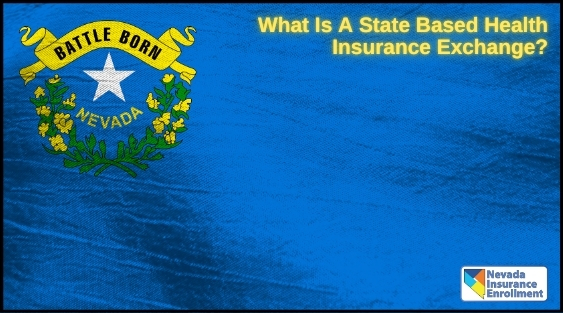Nevada is a State-Based Health Insurance Exchange
Whether you’re looking for health insurance for yourself or your family, you may become familiar with the states health insurance website, Nevada Health Link. This is the only place to go where you can get a subsidy (government assistance) to help pay for your health insurance in Nevada.
IMPORTANT: You can still use a Heath Insurance Agent. Their services are available to guide you either on or off the exchange.

In most cases, when someone is talking about state-based health insurance, they’re referring to a health insurance plan that is regulated by the Department of Insurance in that state. These plans are sold through state health insurance exchanges. Another viable option is enrolling directly with the health insurance carriers without getting a government subsidy with the help of brokers and agents.
State-Based Health Insurance Exchanges And The Affordable Care Act
In 2010, when the Affordable Care Act was signed into law, states were given the option of choosing whether they wanted to establish their own state-based health insurance exchanges or whether residents would instead obtain health insurance through the federally run platform, known as HealthCare.gov.
Some states already had their own exchanges and decided to simply continue making health insurance accessible to residents that way. While others switched from their own exchange to the federal exchange.
State-based health insurance exchanges come with a lot of benefits to residents. For example, in some states, insurers have to meet coverage and rate requirements for their plans to be sold on the state exchange, ensuring that residents have access to better coverage. In some cases, states may even give priority to health insurance companies that offer benefits that align with the overall health needs of the state. Using the federal portal Healthcare.gov is more expensive than using our own State Based Exchange too.

The Difference Between The Two Exchanges
While both on-exchange and off-exchange health insurance plans can provide great coverage, there are some key differences between the two.
On-exchange health insurance plans are purchased through government-created marketplaces online. Off-exchange health insurance plans, on the other hand, are purchased from a health insurance company. They can be purchased directly from the company or they can be purchased through an agency like Nevada Insurance Enrollment.
Having a broker is a huge benefit! At no additional cost to you, an insurance agent can provide you with the information about all the different health insurance companies and their plans as well as assist you with policy questions year round.
3 Reasons to Consider Purchasing an Off-Exchange Plan
More Choices for Health Insurance
On-exchange health insurance are usually HMO plans which limit the freedom to see any provider you are wanting to see. They can only be purchased during “open enrollment” or anytime with a provable “life event” such as, permanent move to NV, loss of coverage from employer, birth of baby, marriage, etc. By purchasing an off-exchange plan through Nevada Insurance Enrollment, you may have greater access to more plans like EPO’s and PPO’s which allow you to see providers without referrals. However, you cannot receive a Government subsidy when buying off-exchange.
Larger Provider Networks
Buying an off-exchange PPO plan gives you the option of selecting a plan that will cover your current doctor, in or out of the network. Most on-exchange plans generally have smaller provider networks, requiring that you pick a primary doctor that is in their network.
Affordability
Our agents are available for in-person visits. All of our agents are licensed, experienced and want to help you get the best plan at the lowest price you are entitled to, whether it is an on-exchange or off-exchange plan.
Reach Out To Nevada Insurance Enrollment
With so many options available, finding great health insurance coverage can be a challenge. At Nevada Insurance Enrollment, our health insurance agents are here to help you make sense of your options to find coverage that will fit your needs and budget.
Recent Posts

HMO, PPO, and EPO. What Is The Difference?
Health Maintenance Organization (HMO) vs. Preferred Provider Organization (PPO) vs. Exclusive Provider Organization (EPO)

Does Health Insurance Cover Drug Rehab?
Many who struggle with substance abuse, also struggle with mental health disorders like depression, anxiety, and bipolar disorder. Often, treatment will include medication, therapy, and rehab for both provided it’s medically necessary.

Catastrophic Health Insurance Explained
Like major medical health insurance plans, catastrophic health insurance covers the 10 essential health benefits outlined in the Affordable Care Act. However, if you have this type of plan, your out-of-pocket costs for services are considerably higher than with regular health insurance.
Search This Website
Most Popular Pages
By page visits (this month)
#1) Health Insurance Subsidy Chart
#2) Health Insurance
#3) Health Insurance WITH a Subsidy
#4) Insurance Blog
#5) Request a Quote
Top 5 Most Popular
By page visits (this month)
#1) Health Insurance Subsidy Chart
#2) Health Insurance
#3) Health Insurance WITH a Subsidy
#4) Insurance Blog Posts
#5) Request a Quote
Recent Posts
What To Do If Your Doctor Leaves Your Health Plan
If you have been fortunate enough to find a primary or specialty care doctor you love, it can be disappointing to say the least, when your doctor will no longer accept your health insurance plan.
Critical Illness Health Insurance: Should I Have It?
Critical illness insurance, which may also be called critical care insurance or critical illness coverage, pays out a lump-sum, tax-free cash benefit, that can help you take care of any expenses that are associated with a qualifying illness.
What Is An Exclusion In Health Insurance?
In health insurance, an exclusion is a medical procedure or treatment that the health insurance company does not cover. This may include specific medications, surgeries or therapies that are specifically omitted from your policy.
How A Divorce Affects Health Insurance Coverage
Going through a divorce can be a very stressful time, and it is unlikely that your health insurance coverage is at the forefront of your mind throughout the proceedings.